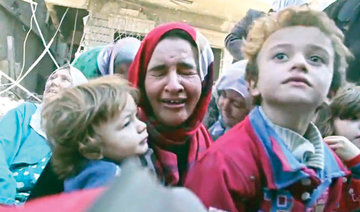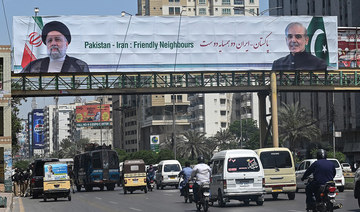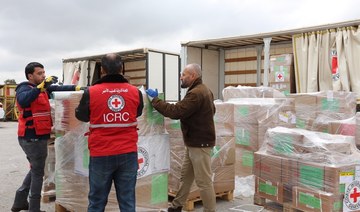BAGHDAD: Their names spread terror across Daesh’s cross-border reign, but senior militants now languish in Iraqi prisons, subjects of mockery for the populace they ruled.
Once boasting nicknames like the Black Box and the Butcher of Mosul, the defeated Daesh commanders now draw vitriol on social media while news outlets have published selfies taken by Iraqi soldiers of them being captured or marched handcuffed in prison uniforms.
Following the militant group’s ouster from second city Mosul last July, Iraqi forces went on the hunt for Daesh fighters who had fled the battlefield.
Researchers estimate they have since put behind bars some 20,000 suspected members of the group.
The search involved digging through the rubble of war-torn Mosul and hunting through the tunnels and hideouts the militants had created during their three-year reign.
It was in Mosul’s Old City, near the Al-Nuri mosque that the elite Counter-Terrorism Service found the senior commander nicknamed the “Black Box” — a moniker that came from his lynchpin role in the organization.
Nizam Eddin Al-Rifai had sent gunmen and suicide bombers in a desperate bid to repel government troops, said Sabah Al-Noman, spokesman for elite units that spearheaded the Mosul offensive.
But in the end he had no choice but to surrender. Cornered by government soldiers, he left his underground hideout bare-chested, his unkempt beard matching his white hair.
Time was finally up for the notoriously hard-line head judge of the “caliphate” which at its height ruled over roughly seven million people in Iraq and Syria.
The 60-year-old Mosulite is still under interrogation, Noman said, adding that he could still give up valuable information about Daesh.
Rifai’s position made him the group’s third in command, according to security sources speaking on condition of anonymity.
He also had the symbolically important role of “teaching theology to Abu Bakr Al-Baghdadi,” the Daesh chief, they said.
Another Daesh member, Mufti Abu Omar (whose real name is Ezzedine Taha Ahmed), spread terror far beyond Mosul through the group’s propaganda efforts.
In one gruesome video, he appeared in military uniform. Sporting a kalashnikov rifle he ordered young people, suspected of being gay, thrown from the roof of a building to their deaths.
That clip and others earned the 62-year-old Iraqi the nickname “Butcher of Mosul.”
Today, he is in the hands of the country’s security forces, who nickname him “White Beard” — facial hair he trimmed as he tried to disguise himself as troops approached.
He escaped, like many militants, by mingling with the flood of civilians fleeing the battle-scarred city center.
He hid in a house in the city’s east, never leaving for fear of being recognized, provincial council security official Mohammed Ibrahim said.
“A neighbor saw him and informed the security forces,” he said.
Today, the “Butcher” is a subject of derision and hatred on social media.
“He terrorized all of Mosul by stoning people to death,” wrote one user.
“Today the people of Mosul should take him to a public place and beat him to death with their shoes.”
Some of those now detained were among the wave of foreigners who flocked to Daesh.
While his comrades enforced Daesh rule, Abu Hamza Al-Beljiki was preparing for the future.
According to investigators, he was in charge of the “cubs of the caliphate” — about 60 children aged 8-13 who received intensive fitness and weapons training.
Abu Hamza is the nom de guerre of Tarik Jadaoun, a Belgian fighter with Moroccan roots, who joined the group in 2014.
After appearing in videos calling for attacks in Europe, he earned the moniker “the new Abaaoud,” after his compatriot Abdelhamid Abaaoud, one of the organizers of the November 2015 attacks in Paris.
Currently detained and awaiting trial, he faces charges under Iraq’s terrorism law, that have already seen several Europeans receive the death penalty.
According to statements by Iraqi justice officials, he made a detailed confession to his jailers.
Now defeated, Iraq’s most feared militants await their fate
Now defeated, Iraq’s most feared militants await their fate

UN chief calls for ‘immediate’ Gaza ceasefire, hostage release

- Israeli strikes on Gaza continued Sunday after it expanded evacuation order for Rafah operation
- Gaza war tearing families apart, rendering people homeless, hungry and traumatized, says UN chief
KUWAIT CITY: UN Secretary-General Antonio Guterres on Sunday urged an immediate halt to the Israel-Hamas war in Gaza, the return of hostages and a “surge” in humanitarian aid to the besieged Palestinian territory.
“I repeat my call, the world’s call for an immediate humanitarian ceasefire, the unconditional release of all hostages and an immediate surge in humanitarian aid,” Guterres said in a video address to an international donors’ conference in Kuwait.
“But a ceasefire will only be the start. It will be a long road back from the devastation and trauma of this war,” he added.
Israeli strikes on Gaza continued on Sunday after it expanded an evacuation order for Rafah despite international outcry over its military incursion into eastern areas of the city, effectively shutting a key aid crossing.
“The war in Gaza is causing horrific human suffering, devastating lives, tearing families apart and rendering huge numbers of people homeless, hungry and traumatized,” Guterres said.
His remarks were played at the opening of the conference in Kuwait organized by the International Islamic Charitable Organization (IICO) and the UN’s humanitarian coordination organization OCHA.
On Friday, in Nairobi, the UN head warned Gaza faced an “epic humanitarian disaster” if Israel launched a full-scale ground operation in Rafah.
Gaza’s bloodiest-ever war began following Hamas’s unprecedented October 7 attack on Israel that resulted in the deaths of more than 1,170 people, mostly civilians, according to an AFP tally of Israeli official figures.
Vowing to destroy Hamas, Israel launched a retaliatory offensive that has killed more than 34,971 people in Gaza, mostly women and children, according to the Hamas-run territory’s health ministry.
UN chief calls for ‘immediate’ Gaza ceasefire, hostage release

- UN chief: ‘The war in Gaza is causing horrific human suffering, devastating lives, tearing families apart and rendering huge numbers of people homeless, hungry and traumatized’
KUWAIT CITY: UN Secretary-General Antonio Guterres on Sunday urged an immediate halt to the Israel-Hamas war in Gaza, the return of hostages and a “surge” in humanitarian aid to the besieged Palestinian territory.
“I repeat my call, the world’s call for an immediate humanitarian ceasefire, the unconditional release of all hostages and an immediate surge in humanitarian aid,” Guterres said in a video address to an international donors’ conference in Kuwait.
“But a ceasefire will only be the start. It will be a long road back from the devastation and trauma of this war,” he added.
Israeli strikes on Gaza continued on Sunday after it expanded an evacuation order for Rafah despite international outcry over its military incursion into eastern areas of the city, effectively shutting a key aid crossing.
“The war in Gaza is causing horrific human suffering, devastating lives, tearing families apart and rendering huge numbers of people homeless, hungry and traumatized,” Guterres said.
His remarks were played at the opening of the conference in Kuwait organized by the International Islamic Charitable Organization (IICO) and the UN’s humanitarian coordination organization OCHA.
On Friday, in Nairobi, the UN head warned Gaza faced an “epic humanitarian disaster” if Israel launched a full-scale ground operation in Rafah.
Gaza’s bloodiest-ever war began following Hamas’s unprecedented October 7 attack on Israel that resulted in the deaths of more than 1,170 people, mostly civilians, according to an AFP tally of Israeli official figures.
Vowing to destroy Hamas, Israel launched a retaliatory offensive that has killed more than 34,971 people in Gaza, mostly women and children, according to the Hamas-run territory’s health ministry.
Iran conservatives tighten grip in parliament vote

- Elected members are to choose a speaker for the 290-seat parliament when they begin their work on May 27
- Conservatives won the majority of the 45 remaining seats up for grabs in the vote held in 15 of 31 provinces: local media
TEHRAN: Iran’s conservatives and ultra-conservatives clinched more seats in a partial rerun of the country’s parliamentary elections, official results showed Saturday, tightening their hold on the chamber.
Voters had been called to cast ballots again on Friday in regions where candidates failed to gain enough votes in the March 1 election, which saw the lowest turnout — 41 percent — since the 1979 Islamic Revolution.
Candidates categorized as conservative or ultra-conservative on pre-election lists won the majority of the 45 remaining seats up for grabs in the vote held in 15 of Iran’s 31 provinces, according to local media.
For the first time in the country, voting on Friday was a completely electronic process at eight of the 22 constituencies in Tehran and the cities of Tabriz in the northwest and Shiraz in the south, state TV said.
“Usually, the participation in the second round is less than the first round,” Interior Minister Ahmad Vahidi told reporters in Tehran, without specifying what the turnout was in the latest round.
“Contrary to some predictions, all the candidates had a relatively acceptable and good number of votes,” he added.
Elected members are to choose a speaker for the 290-seat parliament when they begin their work on May 27.
In March, 25 million Iranians took part in the election out of 61 million eligible voters.
The main coalition of reform parties, the Reform Front, had said ahead of the first round that it would not participate in “meaningless, non-competitive and ineffective elections.”
The vote was the first since nationwide protests broke out following the September 2022 death in custody of Mahsa Amini, a 22-year-old Iranian Kurd, arrested for allegedly breaching the Islamic republic’s strict dress code for women.
In the 2016 parliamentary elections, first-round turnout was above 61 percent, before falling to 42.57 percent in 2020 when elections took place during the Covid pandemic.
UN reports fighting in Sudan’s Darfur involving ‘heavy weaponry’

- The United States last month warned of a looming rebel military offensive on the city, a humanitarian hub that appears to be at the center of a newly opening front in the country’s civil war
PORT SUDAN: A major city in Sudan’s western region of Darfur has been rocked by fighting involving “heavy weaponry,” a senior UN official said Saturday.
Violence erupted in populated areas of El-Fasher, putting about 800,000 people at risk, Clementine Nkweta-Salami, the UN’s humanitarian coordinator for Sudan, said in a statement.
Wounded civilians were being rushed to hospital and civilians were trying to flee the fighting, she added.
“I am gravely concerned by the eruption of clashes in (El-Fasher) despite repeated calls to parties to the conflict to refrain from attacking the city,” said Nkweta-Salami.
“I am equally disturbed by reports of the use of heavy weaponry and attacks in highly populated areas in the city center and the outskirts of (El-Fasher), resulting in multiple casualties,” she added.
For more than a year, Sudan has suffered a war between the army, headed by the country’s de facto leader Abdel Fattah Al-Burhan, and the paramilitary Rapid Support Forces (RSF), commanded by his former deputy Mohamed Hamdan Dagalo.
The war has killed tens of thousands of people and forced more than 8.5 million to flee their homes in what the United Nations has called the “largest displacement crisis in the world.”
The RSF has seized four out of five state capitals in Darfur, a region about the size of France and home to around one quarter of Sudan’s 48 million people.
El-Fasher is the last major city in Darfur that is not under paramilitary control and the United States warned last month of a looming offensive on the city.
UN chief Antonio Guterres said Saturday he was “very concerned about the ongoing war in Sudan.”
“We need an urgent ceasefire and a coordinated international effort to deliver a political process that can get the country back on track,” he said in a post on social media site X.
Tunisian police arrest prominent lawyer critical of president

- Dozens of lawyers took to the streets in protest on Saturday night, carrying banners reading “Our profession will not kneel” and “We will continue the struggle” Saied came to power in free elections in 2019
TUNIS: Tunisian police stormed the building of the Deanship of Lawyers on Saturday and arrested Sonia Dahmani, a lawyer known for her fierce criticism of President Kais Saied, and then arrested two journalists who witnessed the confrontation, a journalists’ syndicate said.
Two IFM radio journalists, Mourad Zghidi and Borhen Bsaiss, were arrested, an official in the country’s main journalists’ syndicate told Reuters. The incident was the latest in a series of arrests and investigations targeting activists, journalists and civil society groups critical of Saied and the government. The move reinforces opponents’ fears of an increasingly authoritarian government ahead of presidential elections expected later this year.
Dahmani was arrested after she said on a television program this week that Tunisia is a country where life is not pleasant. She was commenting on a speech by Saied, who said there was a conspiracy to push thousands of undocumented migrants from Sub-Saharan countries to stay in Tunisia. Dahmani was called before a judge on Wednesday on suspicion of spreading rumors and attacking public security following her comments, but she asked for postponement of the investigation.
The judge rejected her request. Dozens of lawyers took to the streets in protest on Saturday night, carrying banners reading “Our profession will not kneel” and “We will continue the struggle” Saied came to power in free elections in 2019. Two years later he seized additional powers when he shut down the elected parliament and moved to rule by decree before assuming authority over the judiciary.
Since Tunisia’s 2011 revolution, the country has won more press freedoms and is considered one of the more open media environments in the Arab world. Politicians, journalists and unions, however, say that freedom of the press faces a serious threat under the rule of Saied. The president has rejected the accusations and said he will not become a dictator.




















